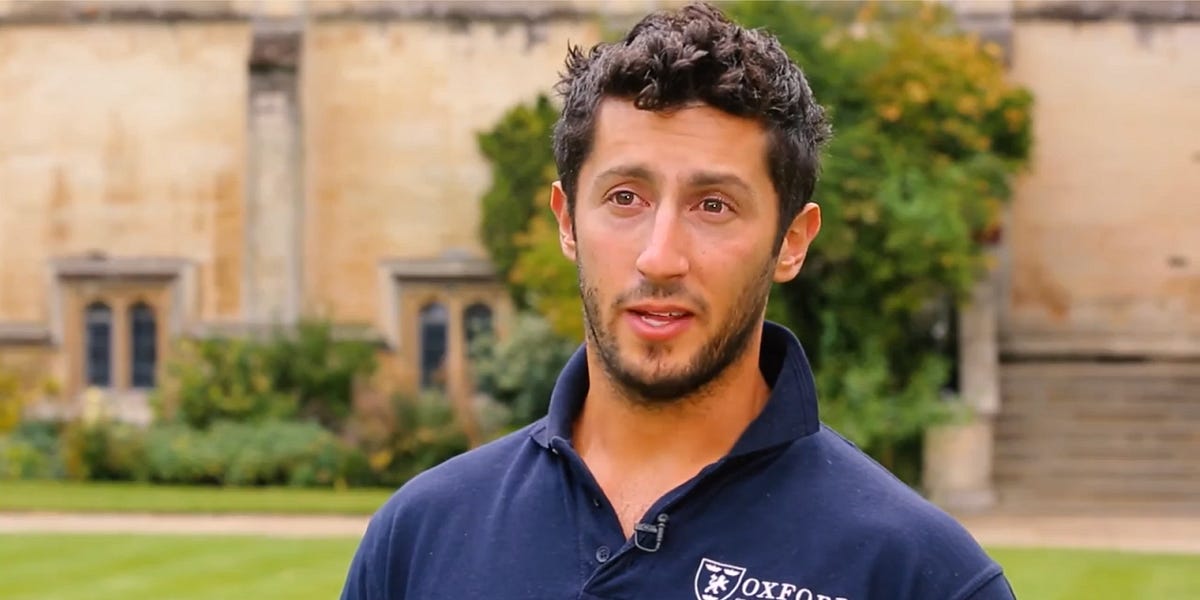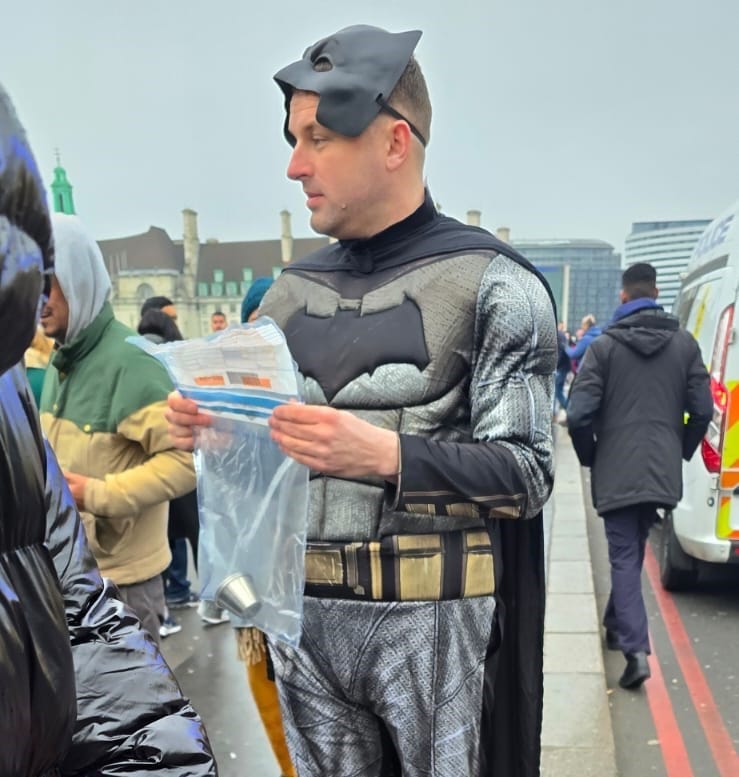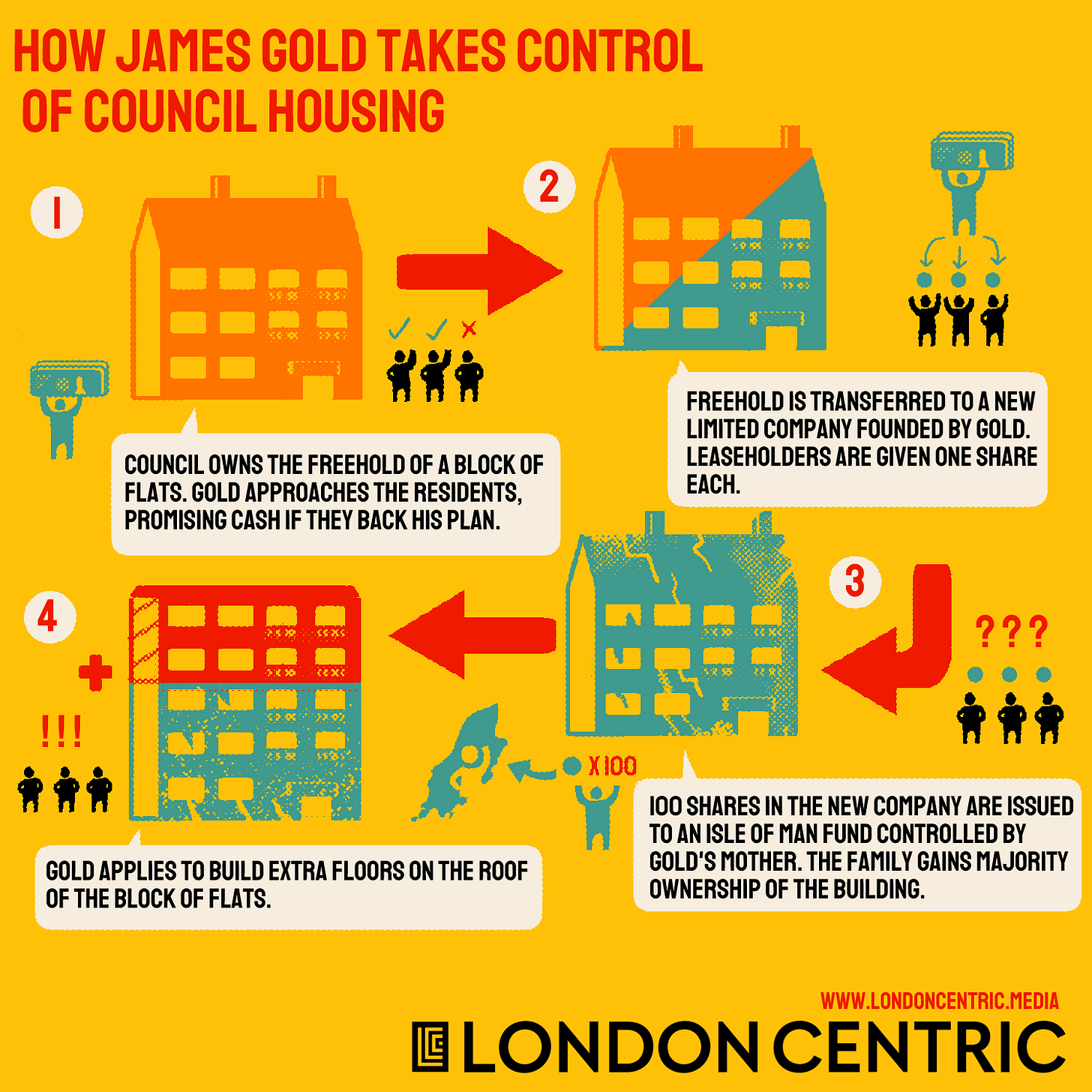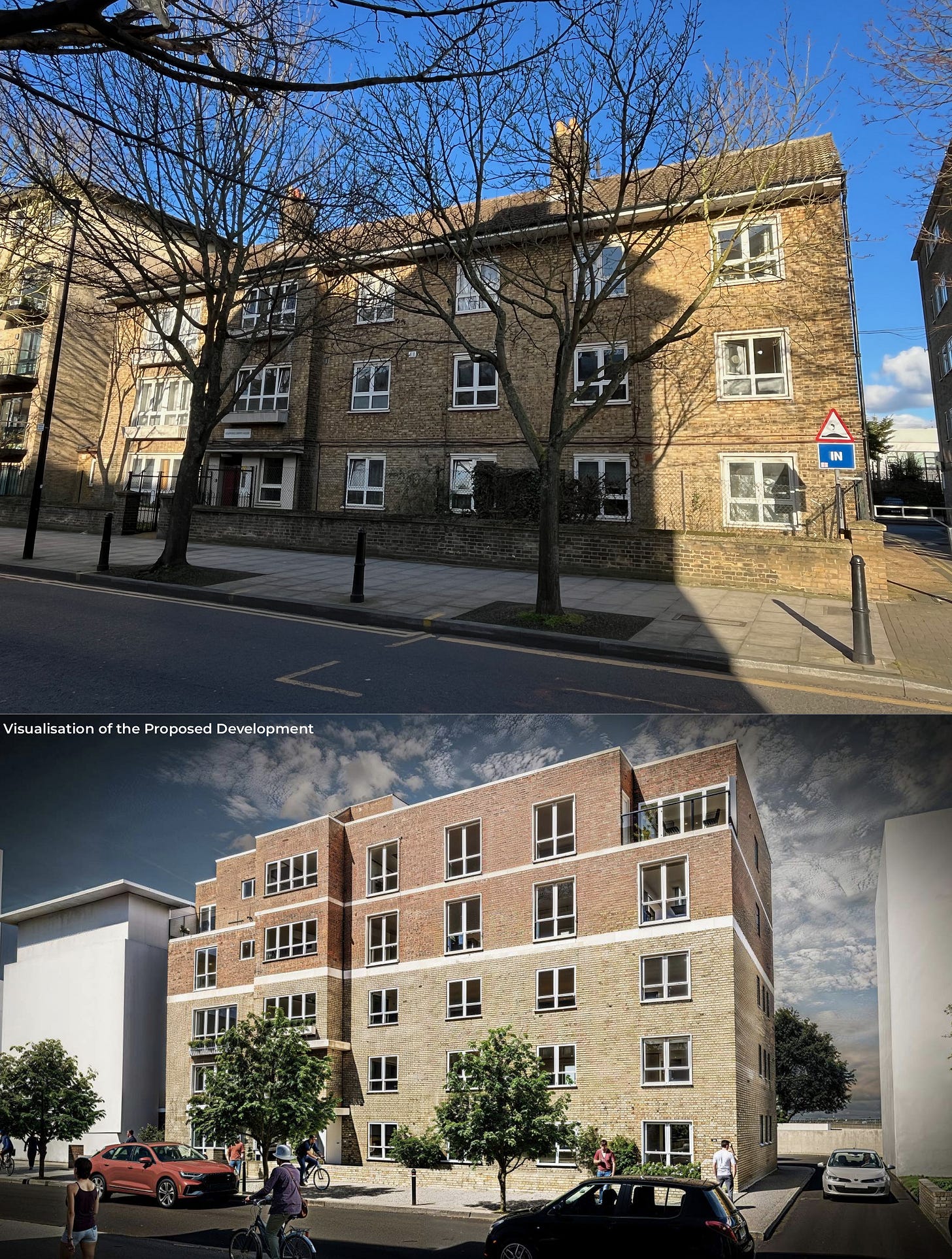
Today London Centric is publishing an investigation into a property developer with a chequered record who has discovered a curious loophole which allows him to take control of council housing across the capital — and then build new private homes on the roof.
This sort of journalism takes an enormous investment of time, money and legal advice — all funded by members. But we believe it adds more to Londoners’ understanding of how the capital really works than any amount of clickbait journalism. Today’s piece is only available for paying subscribers but you can join now for 25% off — or you can take out a free trial.
Scroll down to read the main article — or first read some updates on some of our other stories.

When London Centric investigated brazen illegal activity on Westminster Bridge last autumn it prompted a massive response. Members of parliament flooded our DMs to say how much they despaired about the state of the bridge next to their workplace and what the lack of enforcement said about the country.
Sergeant Darren Watson, the affable policeman interviewed at length in the piece, was frank about his lack of resources and how criminals would run the moment he was seen approaching the bridge.
By now you’ve probably seen his solution, which went viral over the weekend. Watson went undercover as Batman (with his colleague Abdi Osman as Robin) to arrest and secure the convictions of two men “for providing the facilities to gamble”. Eugen Stocia of no fixed address failed to turn up at court while Constica-Gherorghe Barbu of Herbert Road, Greenwich was fined £925 — a small amount given what they can earn from scamming tourists.
The Met police press release is accompanied by CCTV footage that shows the arrest in action, with a video quality that suggests it was filmed at a distance using a potato. This is one of the issues London Centric identified with the bridge. It has very little coverage from security cameras, as its status as a listed building makes them difficult to install in an architecturally sympathetic manner, so criminals know they can operate with relative impunity.
Do read the archive piece if you want to know about the man inside the Batman outfit.
Sadiq Khan will be given formal powers to overrule London councils on licensing issues, with the mayor promising more alfresco dining and late-night opening hours to boost the economy. But it could take a year for the relevant law giving him those powers to be passed by the central government.
As a result City Hall has now written to all 32 London councils asking them to get a move on and voluntarily implement such policies this summer. The problem is that there’s not much Sadiq Khan can actually do to reintroduce outdoor dining in Soho prior to getting his new powers beyond saying “please”.
It’s just the latest skirmish between an underpowered mayoralty and London’s councils that is paralysing the capital’s decision making. James O’Malley and Martin Robbins discussed the issue on their podcast this week following our reporting.
Almost every day London Centric’s readers send in WhatsApps with news of another red paint attack somewhere in the capital, where a house and neighbouring properties are disfigured as part of a suspected intimidation campaign by a triad-linked organised crime group. Last week saw fresh attacks in Walthamstow and another in Tooting, the home turf of mayor of London Sadiq Khan.
Walthamstow MP Stella Creasy has now been told by local police that they have seen eight separate red paint attacks in Waltham Forest alone. According to the local police, an officer is working on the case with support of intelligence teams. The police have visited all the addresses, collected material left behind by the gang, and visited local hardware shops to ask about any “repeat customers” buying large amounts of red paint.
Creasy told London Centric that it’s “good the police now do seem to recognise there’s a pattern” and she is “more concerned than ever that this is evidence of serious criminal activity in Walthamstow”. Her main worry is that this is still being treated as a local issue while she wants to make “the case for joining the dots” across the capital and the rest of the UK with potential involvement from the National Crime Agency.
London Centric’s journalism is only possible with your support. If you haven’t already, please consider becoming a subscriber for 25% off and receive exclusive members-only investigations.
You can always get in touch via email or WhatsApp.
By Cormac Kehoe and Jim Waterson
 James Gold in a previous life running an Oxbridge admissions summer school.
James Gold in a previous life running an Oxbridge admissions summer school.
On the face of it, James Gold appears to be a successful young London property developer who is pioneering a new way to squeeze much-needed extra flats on the roofs of the capital’s council housing blocks.
But an investigation by London Centric has found that the man who is taking control of publicly-owned housing across the city was previously found by the Royal Institution of Chartered Surveyors to be a “dishonest” individual who mishandled client funds and posed “a significant risk to the public”.
Gold is now using a legal loophole to privatise council housing. He stands to earn millions of pounds by building new flats on top of residents’ ceilings after making big promises that seemingly haven’t been fulfilled. Concerns have also been expressed that residents did not receive independent legal advice before they signed paperwork handing over their building to Gold, whose previous companies have left behind a string of angry customers.
Albert Campbell, an 81-year-old resident in one of Gold’s blocks in Tower Hamlets, said he felt hoodwinked into supporting the proposal: “He came to the building, said he’ll give us all this money and there’ll be no change to the service charges.”

According to the residents, Gold has a standard method to gain control of a block of council flats. First, he or his mother cold calls leaseholders and explains they have a little-known right to collectively buy the freehold of their property from their local council.
The freeholder, in these cases the local London borough, owns the land beneath each block of flats and is responsible for maintaining the overall structure and shared areas. The leaseholders are the people who own a lease on an individual apartment within the building, in these cases usually someone who has bought an ex-council flat.
An offer is made to leaseholders, in which Gold promises to pay thousands of pounds and pledge to handle the complicated legal process of buying the freehold from the local council. Gold also pledges to keep their service charges down and improve maintenance. In return he gains the “air rights” to build on the roof of each building.
Once a deal is completed and the council hands over control of the building, residents said that Gold’s promises often fade away as his focus shifts to getting planning permission to build on the roof. Leaseholders in one block complained their service charge was subsequently hiked to “unaffordable” levels, the level of maintenance was cut, and the promised cash lump sums never arrived.
 Stafford Cripps house in Tower Hamlets, close to Bethnal Green tube station, as it appears today (top) and as it is being marketed for sale on behalf of Gold (below) after he took control of the formerly council-owned building.
Stafford Cripps house in Tower Hamlets, close to Bethnal Green tube station, as it appears today (top) and as it is being marketed for sale on behalf of Gold (below) after he took control of the formerly council-owned building.
The 39-year-old University of Cambridge law graduate has also transferred control of at least five ex-council blocks to an obscure tax haven company controlled by his mother. Many of the leaseholders affected said they were not aware of this overseas transfer until informed by London Centric.
In this way housing built with public funds to improve the lives of London’s poorest people has ended up controlled by an off-shore Isle of Man trust.
Housing activists believe this model could now be replicated on a broader scale across the city, as developers wise up to the potential of “air rights” on top of old council blocks to squeeze in highly-profitable private housing — and a new tactic that can be used to obtain development opportunities on the cheap.
Jonathan Moberly, a veteran East End housing activist, said he believes that this use of the collective right to buy a freehold “is offering a blueprint for scammers all over London to raid the publicly owned housing assets of local authorities”
“Failed to act in the best interests of his clients”
James Gold’s entrepreneurial career began early in his life. As a teenager in the mid-2000s he set up a party wall surveying company, which was bringing in hundreds of thousands of pounds a year by the time he was at university. After graduating he founded a summer school business which charged international students £3,600 for advice on how to get into Oxford and Cambridge universities.
His next venture was Landmark Lofts, which earned glowing reviews in the Daily Mail, the Times and the Evening Standard for its apparently revolutionary approach to loft conversion on domestic houses. The company claimed to be able to pre-fabricate its lofts offsite in Yorkshire, and install them on top of London houses in just 14 days. Gold’s business partners on this venture included big name London property developer Henry Smith, who featured in London Centric for evicting hundreds of people in Lewisham before Christmas. (Following the publication of this article Smith got in touch to emphasise that he stepped down from Landmark Lofts and sold his shares in the company in 2011, well before Gold received the damning verdict from his professional body.)
Behind Gold’s apparent financial and media success, however, there was a din of unhappy customers and some extraordinary claims.






